Understanding the Relevance of National Culture in International Business
VerifiedAdded on 2022/12/19
|9
|2190
|83
AI Summary
This article explores the relevance of national culture in international business, focusing on the dimensions of Hofstede's cultural theory. It discusses how cultural factors such as power distance, uncertainty avoidance, individualism, and masculinity/femininity influence decision-making and employee expectations. The article also highlights the challenges faced by organizational leaders in establishing overseas subsidiaries and provides potential solutions.
Contribute Materials
Your contribution can guide someone’s learning journey. Share your
documents today.
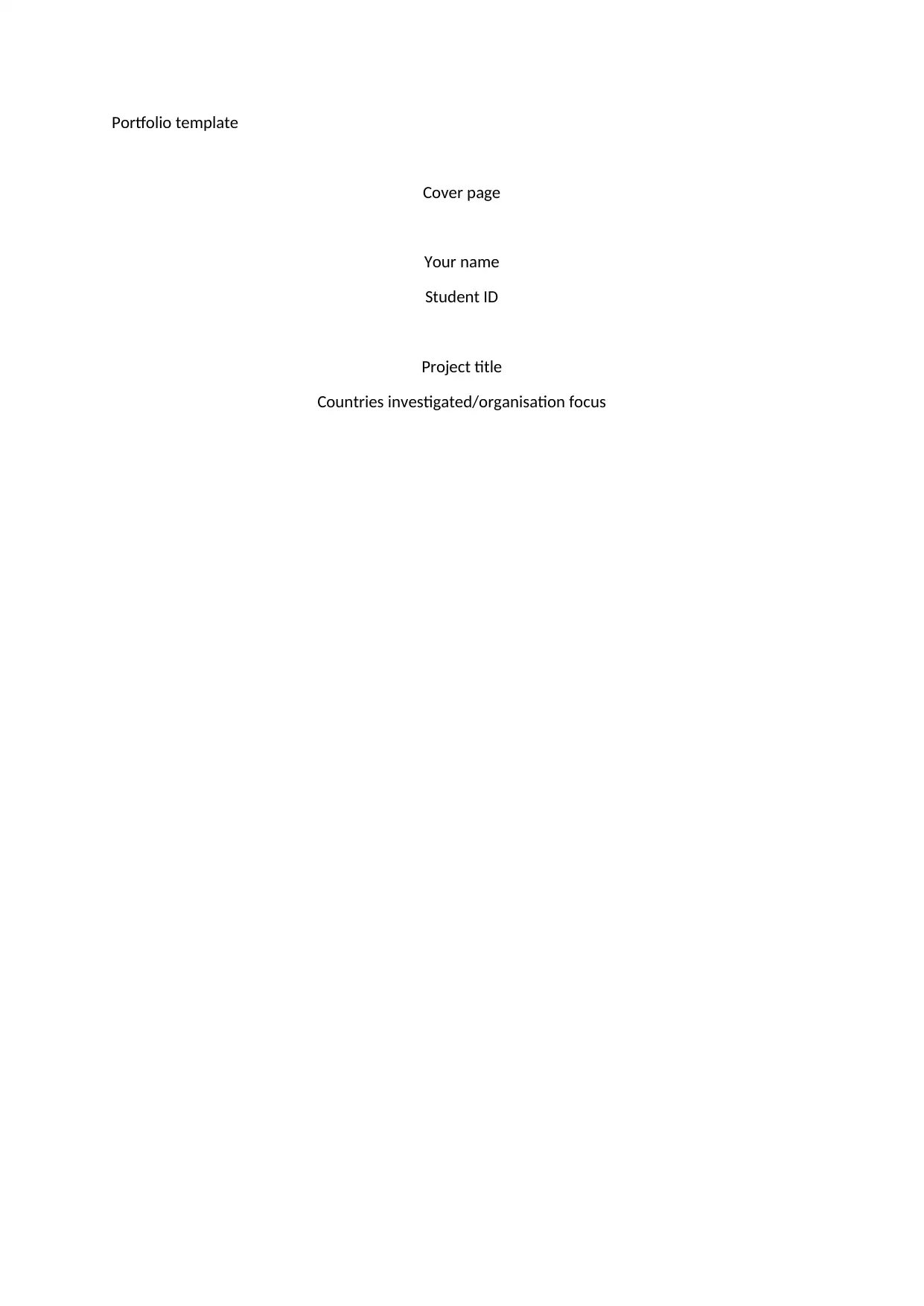
Portfolio template
Cover page
Your name
Student ID
Project title
Countries investigated/organisation focus
Cover page
Your name
Student ID
Project title
Countries investigated/organisation focus
Secure Best Marks with AI Grader
Need help grading? Try our AI Grader for instant feedback on your assignments.

Table of content
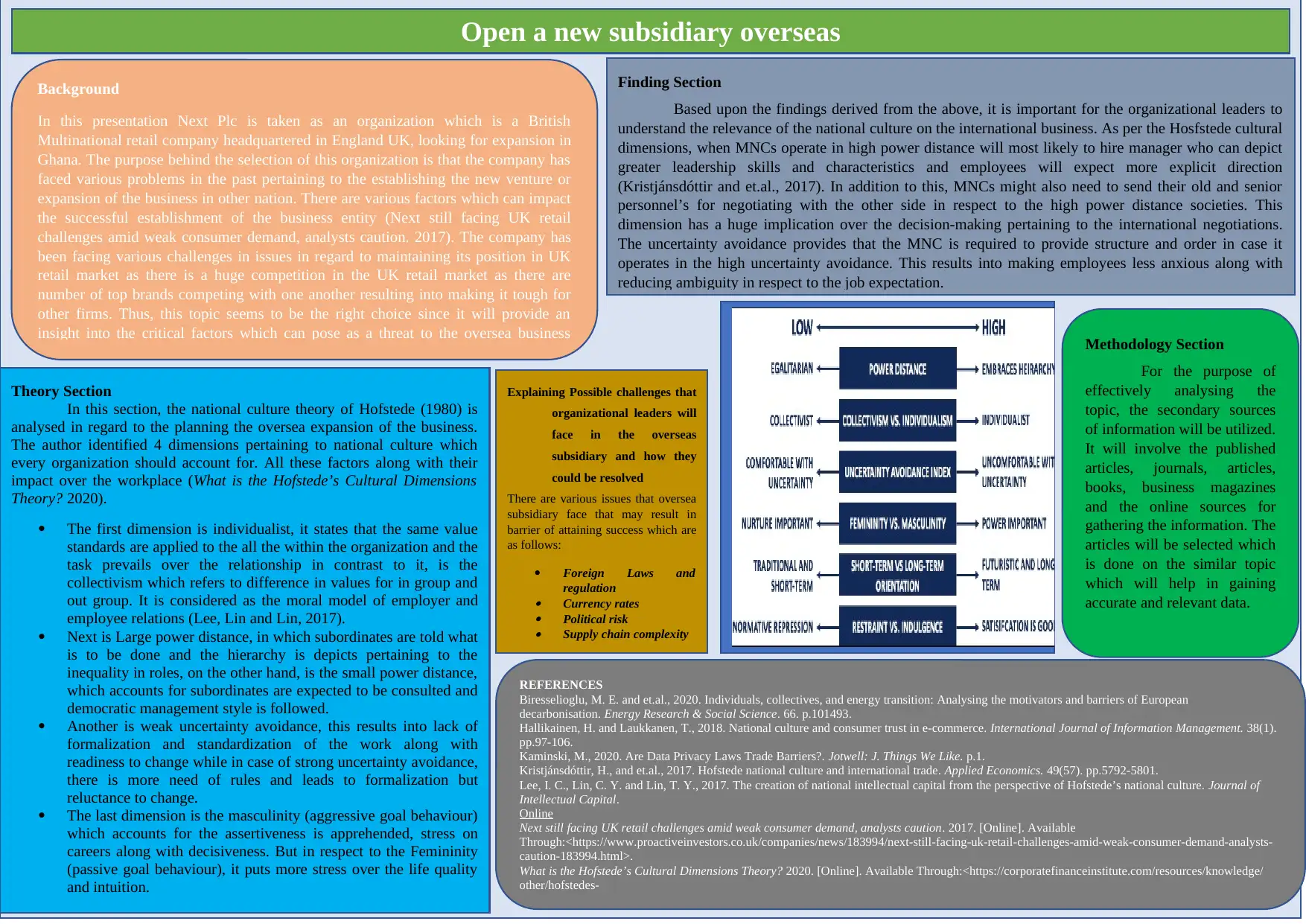
Open a new subsidiary overseas
Background
In this presentation Next Plc is taken as an organization which is a British
Multinational retail company headquartered in England UK, looking for expansion in
Ghana. The purpose behind the selection of this organization is that the company has
faced various problems in the past pertaining to the establishing the new venture or
expansion of the business in other nation. There are various factors which can impact
the successful establishment of the business entity (Next still facing UK retail
challenges amid weak consumer demand, analysts caution. 2017). The company has
been facing various challenges in issues in regard to maintaining its position in UK
retail market as there is a huge competition in the UK retail market as there are
number of top brands competing with one another resulting into making it tough for
other firms. Thus, this topic seems to be the right choice since it will provide an
insight into the critical factors which can pose as a threat to the oversea business Methodology Section
For the purpose of
effectively analysing the
topic, the secondary sources
of information will be utilized.
It will involve the published
articles, journals, articles,
books, business magazines
and the online sources for
gathering the information. The
articles will be selected which
is done on the similar topic
which will help in gaining
accurate and relevant data.
Finding Section
Based upon the findings derived from the above, it is important for the organizational leaders to
understand the relevance of the national culture on the international business. As per the Hosfstede cultural
dimensions, when MNCs operate in high power distance will most likely to hire manager who can depict
greater leadership skills and characteristics and employees will expect more explicit direction
(Kristjánsdóttir and et.al., 2017). In addition to this, MNCs might also need to send their old and senior
personnel’s for negotiating with the other side in respect to the high power distance societies. This
dimension has a huge implication over the decision-making pertaining to the international negotiations.
The uncertainty avoidance provides that the MNC is required to provide structure and order in case it
operates in the high uncertainty avoidance. This results into making employees less anxious along with
reducing ambiguity in respect to the job expectation.
Theory Section
In this section, the national culture theory of Hofstede (1980) is
analysed in regard to the planning the oversea expansion of the business.
The author identified 4 dimensions pertaining to national culture which
every organization should account for. All these factors along with their
impact over the workplace (What is the Hofstede’s Cultural Dimensions
Theory? 2020).
The first dimension is individualist, it states that the same value
standards are applied to the all the within the organization and the
task prevails over the relationship in contrast to it, is the
collectivism which refers to difference in values for in group and
out group. It is considered as the moral model of employer and
employee relations (Lee, Lin and Lin, 2017).
Next is Large power distance, in which subordinates are told what
is to be done and the hierarchy is depicts pertaining to the
inequality in roles, on the other hand, is the small power distance,
which accounts for subordinates are expected to be consulted and
democratic management style is followed.
Another is weak uncertainty avoidance, this results into lack of
formalization and standardization of the work along with
readiness to change while in case of strong uncertainty avoidance,
there is more need of rules and leads to formalization but
reluctance to change.
The last dimension is the masculinity (aggressive goal behaviour)
which accounts for the assertiveness is apprehended, stress on
careers along with decisiveness. But in respect to the Femininity
(passive goal behaviour), it puts more stress over the life quality
and intuition.
REFERENCES
Biresselioglu, M. E. and et.al., 2020. Individuals, collectives, and energy transition: Analysing the motivators and barriers of European
decarbonisation. Energy Research & Social Science. 66. p.101493.
Hallikainen, H. and Laukkanen, T., 2018. National culture and consumer trust in e-commerce. International Journal of Information Management. 38(1).
pp.97-106.
Kaminski, M., 2020. Are Data Privacy Laws Trade Barriers?. Jotwell: J. Things We Like. p.1.
Kristjánsdóttir, H., and et.al., 2017. Hofstede national culture and international trade. Applied Economics. 49(57). pp.5792-5801.
Lee, I. C., Lin, C. Y. and Lin, T. Y., 2017. The creation of national intellectual capital from the perspective of Hofstede’s national culture. Journal of
Intellectual Capital.
Online
Next still facing UK retail challenges amid weak consumer demand, analysts caution. 2017. [Online]. Available
Through:<https://www.proactiveinvestors.co.uk/companies/news/183994/next-still-facing-uk-retail-challenges-amid-weak-consumer-demand-analysts-
caution-183994.html>.
What is the Hofstede’s Cultural Dimensions Theory? 2020. [Online]. Available Through:<https://corporatefinanceinstitute.com/resources/knowledge/
other/hofstedes-
Explaining Possible challenges that
organizational leaders will
face in the overseas
subsidiary and how they
could be resolved
There are various issues that oversea
subsidiary face that may result in
barrier of attaining success which are
as follows:
Foreign Laws and
regulation
Currency rates
Political risk
Supply chain complexity
Background
In this presentation Next Plc is taken as an organization which is a British
Multinational retail company headquartered in England UK, looking for expansion in
Ghana. The purpose behind the selection of this organization is that the company has
faced various problems in the past pertaining to the establishing the new venture or
expansion of the business in other nation. There are various factors which can impact
the successful establishment of the business entity (Next still facing UK retail
challenges amid weak consumer demand, analysts caution. 2017). The company has
been facing various challenges in issues in regard to maintaining its position in UK
retail market as there is a huge competition in the UK retail market as there are
number of top brands competing with one another resulting into making it tough for
other firms. Thus, this topic seems to be the right choice since it will provide an
insight into the critical factors which can pose as a threat to the oversea business Methodology Section
For the purpose of
effectively analysing the
topic, the secondary sources
of information will be utilized.
It will involve the published
articles, journals, articles,
books, business magazines
and the online sources for
gathering the information. The
articles will be selected which
is done on the similar topic
which will help in gaining
accurate and relevant data.
Finding Section
Based upon the findings derived from the above, it is important for the organizational leaders to
understand the relevance of the national culture on the international business. As per the Hosfstede cultural
dimensions, when MNCs operate in high power distance will most likely to hire manager who can depict
greater leadership skills and characteristics and employees will expect more explicit direction
(Kristjánsdóttir and et.al., 2017). In addition to this, MNCs might also need to send their old and senior
personnel’s for negotiating with the other side in respect to the high power distance societies. This
dimension has a huge implication over the decision-making pertaining to the international negotiations.
The uncertainty avoidance provides that the MNC is required to provide structure and order in case it
operates in the high uncertainty avoidance. This results into making employees less anxious along with
reducing ambiguity in respect to the job expectation.
Theory Section
In this section, the national culture theory of Hofstede (1980) is
analysed in regard to the planning the oversea expansion of the business.
The author identified 4 dimensions pertaining to national culture which
every organization should account for. All these factors along with their
impact over the workplace (What is the Hofstede’s Cultural Dimensions
Theory? 2020).
The first dimension is individualist, it states that the same value
standards are applied to the all the within the organization and the
task prevails over the relationship in contrast to it, is the
collectivism which refers to difference in values for in group and
out group. It is considered as the moral model of employer and
employee relations (Lee, Lin and Lin, 2017).
Next is Large power distance, in which subordinates are told what
is to be done and the hierarchy is depicts pertaining to the
inequality in roles, on the other hand, is the small power distance,
which accounts for subordinates are expected to be consulted and
democratic management style is followed.
Another is weak uncertainty avoidance, this results into lack of
formalization and standardization of the work along with
readiness to change while in case of strong uncertainty avoidance,
there is more need of rules and leads to formalization but
reluctance to change.
The last dimension is the masculinity (aggressive goal behaviour)
which accounts for the assertiveness is apprehended, stress on
careers along with decisiveness. But in respect to the Femininity
(passive goal behaviour), it puts more stress over the life quality
and intuition.
REFERENCES
Biresselioglu, M. E. and et.al., 2020. Individuals, collectives, and energy transition: Analysing the motivators and barriers of European
decarbonisation. Energy Research & Social Science. 66. p.101493.
Hallikainen, H. and Laukkanen, T., 2018. National culture and consumer trust in e-commerce. International Journal of Information Management. 38(1).
pp.97-106.
Kaminski, M., 2020. Are Data Privacy Laws Trade Barriers?. Jotwell: J. Things We Like. p.1.
Kristjánsdóttir, H., and et.al., 2017. Hofstede national culture and international trade. Applied Economics. 49(57). pp.5792-5801.
Lee, I. C., Lin, C. Y. and Lin, T. Y., 2017. The creation of national intellectual capital from the perspective of Hofstede’s national culture. Journal of
Intellectual Capital.
Online
Next still facing UK retail challenges amid weak consumer demand, analysts caution. 2017. [Online]. Available
Through:<https://www.proactiveinvestors.co.uk/companies/news/183994/next-still-facing-uk-retail-challenges-amid-weak-consumer-demand-analysts-
caution-183994.html>.
What is the Hofstede’s Cultural Dimensions Theory? 2020. [Online]. Available Through:<https://corporatefinanceinstitute.com/resources/knowledge/
other/hofstedes-
Explaining Possible challenges that
organizational leaders will
face in the overseas
subsidiary and how they
could be resolved
There are various issues that oversea
subsidiary face that may result in
barrier of attaining success which are
as follows:
Foreign Laws and
regulation
Currency rates
Political risk
Supply chain complexity
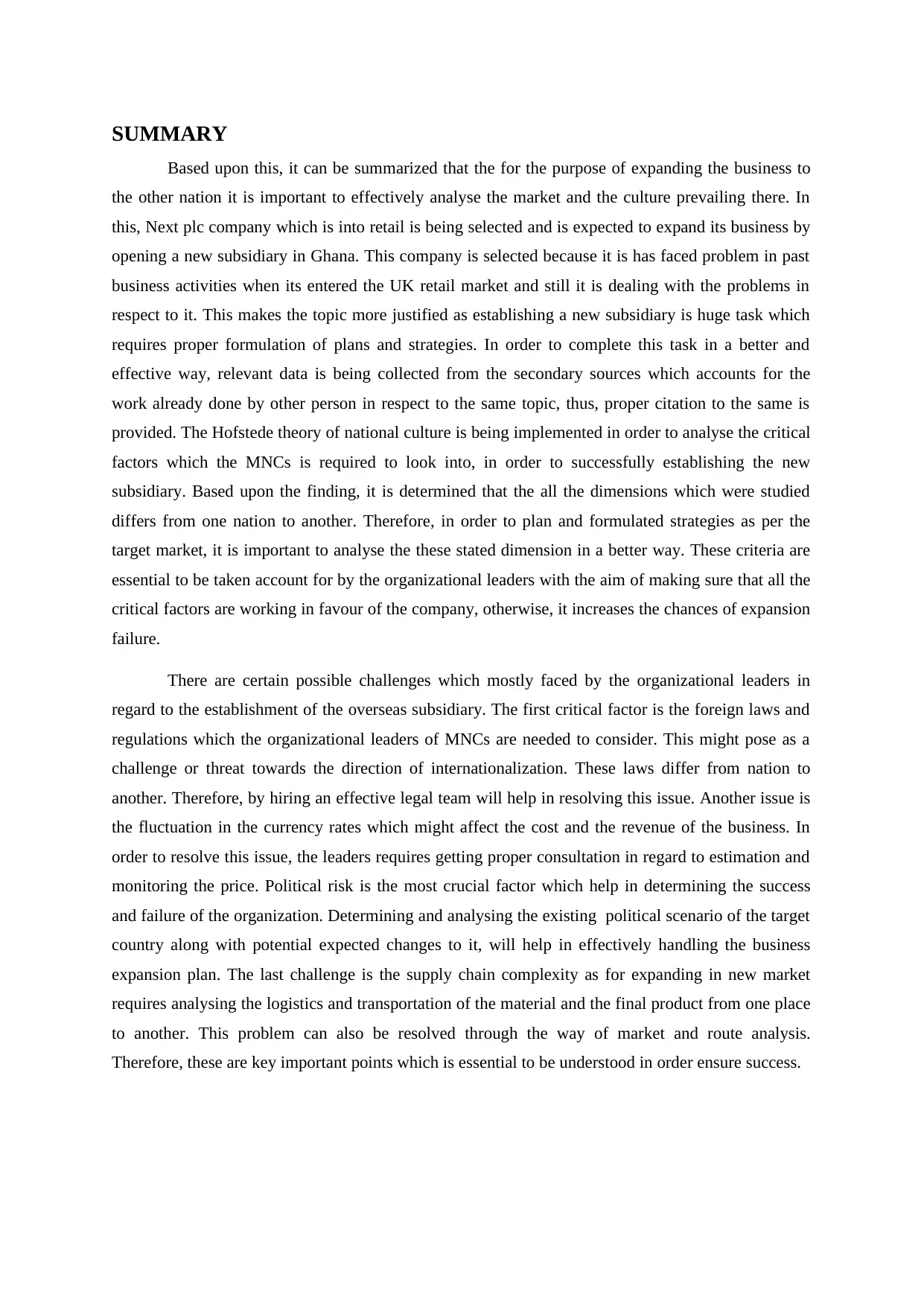
SUMMARY
Based upon this, it can be summarized that the for the purpose of expanding the business to
the other nation it is important to effectively analyse the market and the culture prevailing there. In
this, Next plc company which is into retail is being selected and is expected to expand its business by
opening a new subsidiary in Ghana. This company is selected because it is has faced problem in past
business activities when its entered the UK retail market and still it is dealing with the problems in
respect to it. This makes the topic more justified as establishing a new subsidiary is huge task which
requires proper formulation of plans and strategies. In order to complete this task in a better and
effective way, relevant data is being collected from the secondary sources which accounts for the
work already done by other person in respect to the same topic, thus, proper citation to the same is
provided. The Hofstede theory of national culture is being implemented in order to analyse the critical
factors which the MNCs is required to look into, in order to successfully establishing the new
subsidiary. Based upon the finding, it is determined that the all the dimensions which were studied
differs from one nation to another. Therefore, in order to plan and formulated strategies as per the
target market, it is important to analyse the these stated dimension in a better way. These criteria are
essential to be taken account for by the organizational leaders with the aim of making sure that all the
critical factors are working in favour of the company, otherwise, it increases the chances of expansion
failure.
There are certain possible challenges which mostly faced by the organizational leaders in
regard to the establishment of the overseas subsidiary. The first critical factor is the foreign laws and
regulations which the organizational leaders of MNCs are needed to consider. This might pose as a
challenge or threat towards the direction of internationalization. These laws differ from nation to
another. Therefore, by hiring an effective legal team will help in resolving this issue. Another issue is
the fluctuation in the currency rates which might affect the cost and the revenue of the business. In
order to resolve this issue, the leaders requires getting proper consultation in regard to estimation and
monitoring the price. Political risk is the most crucial factor which help in determining the success
and failure of the organization. Determining and analysing the existing political scenario of the target
country along with potential expected changes to it, will help in effectively handling the business
expansion plan. The last challenge is the supply chain complexity as for expanding in new market
requires analysing the logistics and transportation of the material and the final product from one place
to another. This problem can also be resolved through the way of market and route analysis.
Therefore, these are key important points which is essential to be understood in order ensure success.
Based upon this, it can be summarized that the for the purpose of expanding the business to
the other nation it is important to effectively analyse the market and the culture prevailing there. In
this, Next plc company which is into retail is being selected and is expected to expand its business by
opening a new subsidiary in Ghana. This company is selected because it is has faced problem in past
business activities when its entered the UK retail market and still it is dealing with the problems in
respect to it. This makes the topic more justified as establishing a new subsidiary is huge task which
requires proper formulation of plans and strategies. In order to complete this task in a better and
effective way, relevant data is being collected from the secondary sources which accounts for the
work already done by other person in respect to the same topic, thus, proper citation to the same is
provided. The Hofstede theory of national culture is being implemented in order to analyse the critical
factors which the MNCs is required to look into, in order to successfully establishing the new
subsidiary. Based upon the finding, it is determined that the all the dimensions which were studied
differs from one nation to another. Therefore, in order to plan and formulated strategies as per the
target market, it is important to analyse the these stated dimension in a better way. These criteria are
essential to be taken account for by the organizational leaders with the aim of making sure that all the
critical factors are working in favour of the company, otherwise, it increases the chances of expansion
failure.
There are certain possible challenges which mostly faced by the organizational leaders in
regard to the establishment of the overseas subsidiary. The first critical factor is the foreign laws and
regulations which the organizational leaders of MNCs are needed to consider. This might pose as a
challenge or threat towards the direction of internationalization. These laws differ from nation to
another. Therefore, by hiring an effective legal team will help in resolving this issue. Another issue is
the fluctuation in the currency rates which might affect the cost and the revenue of the business. In
order to resolve this issue, the leaders requires getting proper consultation in regard to estimation and
monitoring the price. Political risk is the most crucial factor which help in determining the success
and failure of the organization. Determining and analysing the existing political scenario of the target
country along with potential expected changes to it, will help in effectively handling the business
expansion plan. The last challenge is the supply chain complexity as for expanding in new market
requires analysing the logistics and transportation of the material and the final product from one place
to another. This problem can also be resolved through the way of market and route analysis.
Therefore, these are key important points which is essential to be understood in order ensure success.
Secure Best Marks with AI Grader
Need help grading? Try our AI Grader for instant feedback on your assignments.
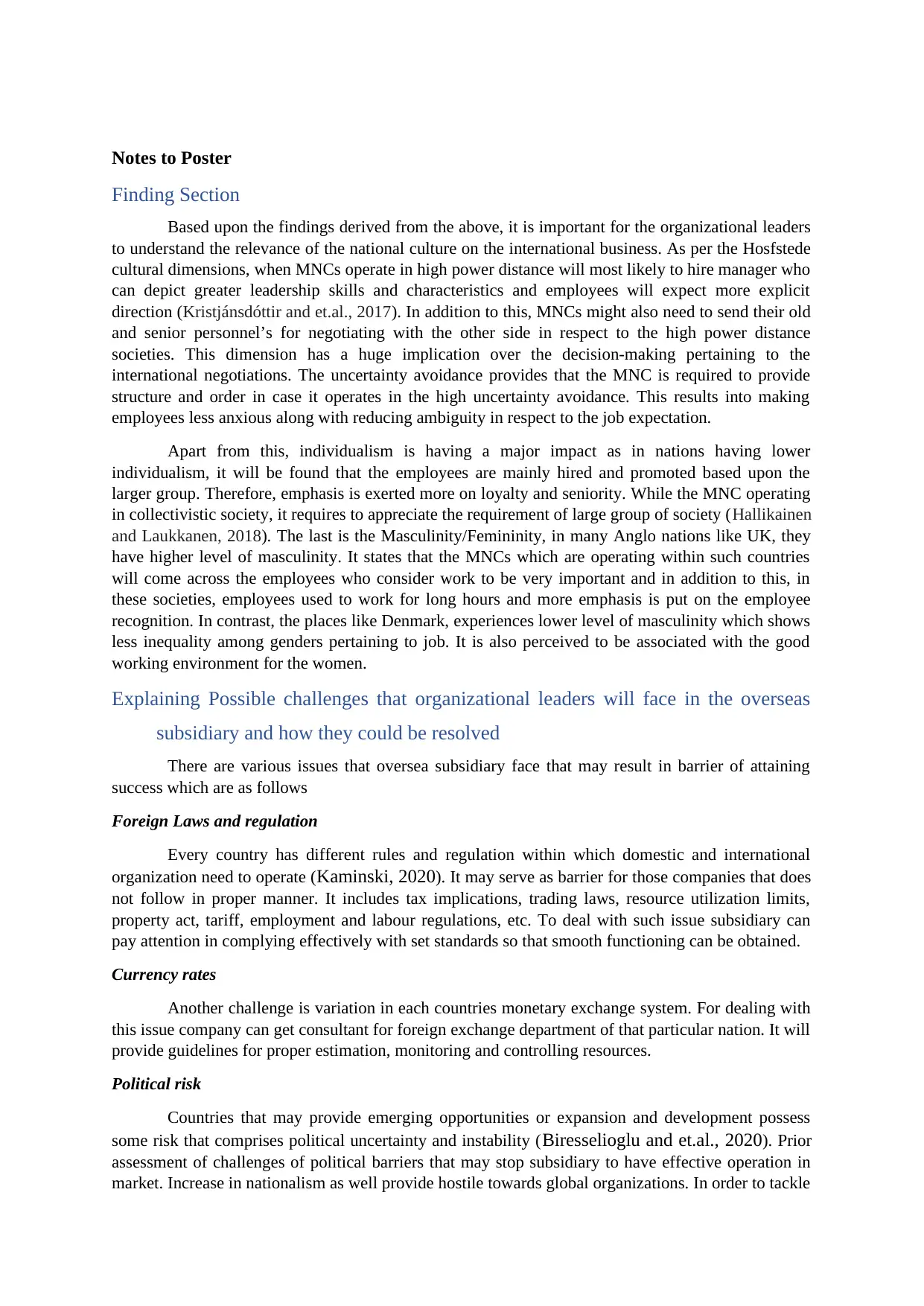
Notes to Poster
Finding Section
Based upon the findings derived from the above, it is important for the organizational leaders
to understand the relevance of the national culture on the international business. As per the Hosfstede
cultural dimensions, when MNCs operate in high power distance will most likely to hire manager who
can depict greater leadership skills and characteristics and employees will expect more explicit
direction (Kristjánsdóttir and et.al., 2017). In addition to this, MNCs might also need to send their old
and senior personnel’s for negotiating with the other side in respect to the high power distance
societies. This dimension has a huge implication over the decision-making pertaining to the
international negotiations. The uncertainty avoidance provides that the MNC is required to provide
structure and order in case it operates in the high uncertainty avoidance. This results into making
employees less anxious along with reducing ambiguity in respect to the job expectation.
Apart from this, individualism is having a major impact as in nations having lower
individualism, it will be found that the employees are mainly hired and promoted based upon the
larger group. Therefore, emphasis is exerted more on loyalty and seniority. While the MNC operating
in collectivistic society, it requires to appreciate the requirement of large group of society (Hallikainen
and Laukkanen, 2018). The last is the Masculinity/Femininity, in many Anglo nations like UK, they
have higher level of masculinity. It states that the MNCs which are operating within such countries
will come across the employees who consider work to be very important and in addition to this, in
these societies, employees used to work for long hours and more emphasis is put on the employee
recognition. In contrast, the places like Denmark, experiences lower level of masculinity which shows
less inequality among genders pertaining to job. It is also perceived to be associated with the good
working environment for the women.
Explaining Possible challenges that organizational leaders will face in the overseas
subsidiary and how they could be resolved
There are various issues that oversea subsidiary face that may result in barrier of attaining
success which are as follows
Foreign Laws and regulation
Every country has different rules and regulation within which domestic and international
organization need to operate (Kaminski, 2020). It may serve as barrier for those companies that does
not follow in proper manner. It includes tax implications, trading laws, resource utilization limits,
property act, tariff, employment and labour regulations, etc. To deal with such issue subsidiary can
pay attention in complying effectively with set standards so that smooth functioning can be obtained.
Currency rates
Another challenge is variation in each countries monetary exchange system. For dealing with
this issue company can get consultant for foreign exchange department of that particular nation. It will
provide guidelines for proper estimation, monitoring and controlling resources.
Political risk
Countries that may provide emerging opportunities or expansion and development possess
some risk that comprises political uncertainty and instability (Biresselioglu and et.al., 2020). Prior
assessment of challenges of political barriers that may stop subsidiary to have effective operation in
market. Increase in nationalism as well provide hostile towards global organizations. In order to tackle
Finding Section
Based upon the findings derived from the above, it is important for the organizational leaders
to understand the relevance of the national culture on the international business. As per the Hosfstede
cultural dimensions, when MNCs operate in high power distance will most likely to hire manager who
can depict greater leadership skills and characteristics and employees will expect more explicit
direction (Kristjánsdóttir and et.al., 2017). In addition to this, MNCs might also need to send their old
and senior personnel’s for negotiating with the other side in respect to the high power distance
societies. This dimension has a huge implication over the decision-making pertaining to the
international negotiations. The uncertainty avoidance provides that the MNC is required to provide
structure and order in case it operates in the high uncertainty avoidance. This results into making
employees less anxious along with reducing ambiguity in respect to the job expectation.
Apart from this, individualism is having a major impact as in nations having lower
individualism, it will be found that the employees are mainly hired and promoted based upon the
larger group. Therefore, emphasis is exerted more on loyalty and seniority. While the MNC operating
in collectivistic society, it requires to appreciate the requirement of large group of society (Hallikainen
and Laukkanen, 2018). The last is the Masculinity/Femininity, in many Anglo nations like UK, they
have higher level of masculinity. It states that the MNCs which are operating within such countries
will come across the employees who consider work to be very important and in addition to this, in
these societies, employees used to work for long hours and more emphasis is put on the employee
recognition. In contrast, the places like Denmark, experiences lower level of masculinity which shows
less inequality among genders pertaining to job. It is also perceived to be associated with the good
working environment for the women.
Explaining Possible challenges that organizational leaders will face in the overseas
subsidiary and how they could be resolved
There are various issues that oversea subsidiary face that may result in barrier of attaining
success which are as follows
Foreign Laws and regulation
Every country has different rules and regulation within which domestic and international
organization need to operate (Kaminski, 2020). It may serve as barrier for those companies that does
not follow in proper manner. It includes tax implications, trading laws, resource utilization limits,
property act, tariff, employment and labour regulations, etc. To deal with such issue subsidiary can
pay attention in complying effectively with set standards so that smooth functioning can be obtained.
Currency rates
Another challenge is variation in each countries monetary exchange system. For dealing with
this issue company can get consultant for foreign exchange department of that particular nation. It will
provide guidelines for proper estimation, monitoring and controlling resources.
Political risk
Countries that may provide emerging opportunities or expansion and development possess
some risk that comprises political uncertainty and instability (Biresselioglu and et.al., 2020). Prior
assessment of challenges of political barriers that may stop subsidiary to have effective operation in
market. Increase in nationalism as well provide hostile towards global organizations. In order to tackle
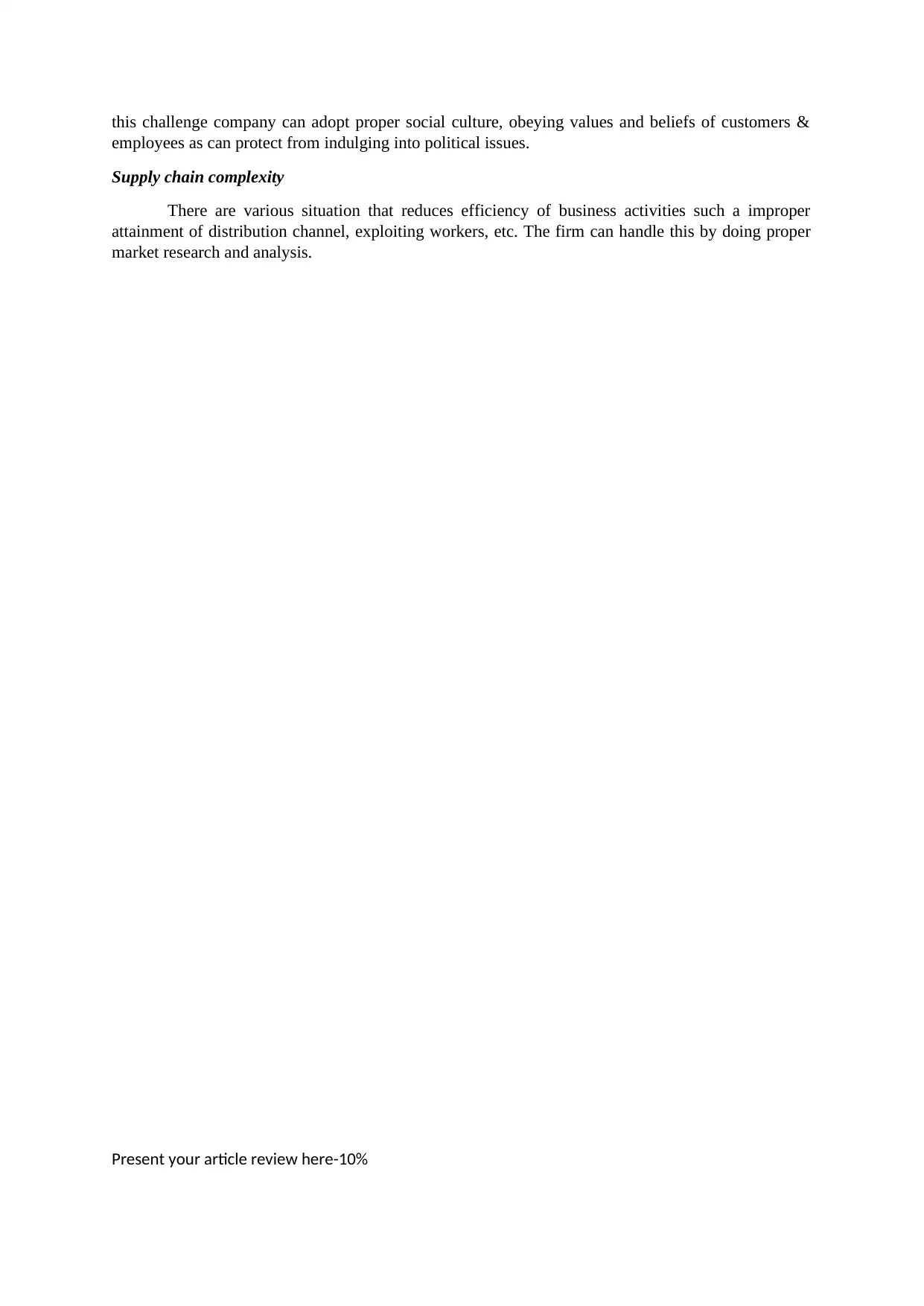
this challenge company can adopt proper social culture, obeying values and beliefs of customers &
employees as can protect from indulging into political issues.
Supply chain complexity
There are various situation that reduces efficiency of business activities such a improper
attainment of distribution channel, exploiting workers, etc. The firm can handle this by doing proper
market research and analysis.
Present your article review here-10%
employees as can protect from indulging into political issues.
Supply chain complexity
There are various situation that reduces efficiency of business activities such a improper
attainment of distribution channel, exploiting workers, etc. The firm can handle this by doing proper
market research and analysis.
Present your article review here-10%

Present the feedback you received, and the feedback give here- 10%
Paraphrase This Document
Need a fresh take? Get an instant paraphrase of this document with our AI Paraphraser

Attendance diary here- 10%

1 out of 9
Related Documents
Your All-in-One AI-Powered Toolkit for Academic Success.
+13062052269
info@desklib.com
Available 24*7 on WhatsApp / Email
![[object Object]](/_next/static/media/star-bottom.7253800d.svg)
Unlock your academic potential
© 2024 | Zucol Services PVT LTD | All rights reserved.





